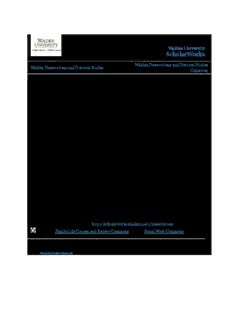
Young Adult Narratives of Sibling Loss and Bereavement during Adolescence PDF
Preview Young Adult Narratives of Sibling Loss and Bereavement during Adolescence
Walden University ScholarWorks Walden Dissertations and Doctoral Studies Walden Dissertations and Doctoral Studies Collection 2017 Young Adult Narratives of Sibling Loss and Bereavement during Adolescence Kelly Lynn Collins-Colosi Walden University Follow this and additional works at:https://scholarworks.waldenu.edu/dissertations Part of theFamily, Life Course, and Society Commons, and theSocial Work Commons This Dissertation is brought to you for free and open access by the Walden Dissertations and Doctoral Studies Collection at ScholarWorks. It has been accepted for inclusion in Walden Dissertations and Doctoral Studies by an authorized administrator of ScholarWorks. For more information, please [email protected]. Walden University College of Social and Behavioral Sciences This is to certify that the doctoral dissertation by Kelly Collins-Colosi has been found to be complete and satisfactory in all respects, and that any and all revisions required by the review committee have been made. Review Committee Dr. Susan Marcus, Committee Chairperson, Psychology Faculty Dr. Elisha Galaif, Committee Member, Psychology Faculty Dr. Susana Verdinelli, University Reviewer, Psychology Faculty Chief Academic Officer Eric Riedel, Ph.D. Walden University 2016 Abstract Young Adult Narratives of Sibling Loss and Bereavement during Adolescence by Kelly L. Collins-Colosi MA, Marywood University, 2003 BS, Binghamton University, 2001 Dissertation Submitted in Fulfillment of the Requirements for the Degree of Doctor of Philosophy Health Psychology Walden University December 2016 Abstract Up to 90% of adolescents in the U.S. experience a loss of a family member or friend. However, prior research on loss of a family member has focused predominantly on the adult experience (e.g., loss of a spouse), parental bereavement (loss of a child), or grief counseling as an intervention for dealing with loss. Little is known about the sibling loss experience, particularly from the point of view of the surviving sibling who suffered the loss when they were young. Thus, the purpose of this qualitative study was to explore the narratives of young adults who experienced the loss of a sibling during adolescence, and to understand the role of family, friends, and resources. This research utilized three theoretical models: Erik Erickson’s theory of Psychosocial Development, Murray Bowen’s theory of Family Systems, and Theresa Rando’s 6 R’s theory of loss. Eight participants (all female) between 18 and 30 years who lost a sibling between 13 and 18 years were invited through posting in 4 closed sibling loss groups on Facebook. Using Reissman’s thematic analysis, data from semi-structured interviews revealed five themes: returning to school (refuge vs. struggle); being there (sources of support); emotional separation (family, friends, and the lost sibling); identification of self/moving forward (turning points following the loss); and family dynamics with departed and surviving (maintaining the lost connection). Future research should intentionally sample other demographics to broaden the understanding of sibling bereavement across age, gender, ethnicity, and religion. Positive social change implications include efforts to promote training and programs sensitive to the unique needs of bereaved young adults in secondary school and college settings. Young Adult Narratives of Sibling Loss and Bereavement during Adolescence by Kelly L. Collins-Colosi MA, Marywood University, 2003 BS, Binghamton University, 2001 Dissertation Submitted in Fulfillment of the Requirements for the Degree of Doctor of Philosophy Health Psychology Walden University December 2016 Dedication This work is dedicated to all those who have lost a sibling. Especially, for my little sister Emily Elizabeth Collins. Truly the best sister one could ever ask for, 3/8/1982 to 11/11/2000. Acknowledgments For my daughters Emma and Abby Colosi, for the love and patience you shared, the encouragement you gave, and the time you gave away so that this dream could be accomplished. May you always reach for the stars! For my husband Nick, for your patience, love and support to survive this journey. It would not have been possible without you. For my parents Terry and Bob, for teaching me to always believe in myself and instilling the values to never, ever give up. Without you this would not have been possible. To Dr. Susan Marcus, for your continued guidance, patience, and support. I truly would have never made it thought his journey without you. Thank you for all you do, you are a true miracle worker! Table of Contents Chapter 1: Introduction to the Study ....................................................................................1 Background ....................................................................................................................2 Problem Statement .........................................................................................................5 Purpose of the Study ......................................................................................................5 Research Questions ........................................................................................................6 Theoretical Framework ..................................................................................................6 Nature of the Study ........................................................................................................9 Definitions....................................................................................................................11 Assumptions .................................................................................................................12 Scope and Delimitations ..............................................................................................13 Limitations ...................................................................................................................13 Significance..................................................................................................................14 Chapter Summary ........................................................................................................15 Chapter 2: Literature Review .............................................................................................16 Introduction ..................................................................................................................16 Literature Search Strategy............................................................................................18 Theoretical Framework ................................................................................................19 Erikson’s Theory of Psycho-Social Development ................................................ 19 Bowen’s Family Systems Theory ......................................................................... 21 Rando’s 6-R Model of Loss .................................................................................. 27 Sibling Bereavement Experience .................................................................................29 i Sibling Bereavement–Type of Loss Experienced ................................................. 29 Sibling Bereavement–Effects on Behavior ........................................................... 30 Sibling Bereavement–School Performance .......................................................... 32 Sibling Bereavement-Interventions ...................................................................... 33 Limitations of Current Research ..................................................................................35 Chapter Summary ........................................................................................................36 Chapter 3: Research Method ..............................................................................................37 Introduction ..................................................................................................................37 Research Design and Rationale ...................................................................................37 Role of the Researcher .......................................................................................... 39 Methodology ................................................................................................................41 Participant Selection Logic ................................................................................... 41 Sample and Sampling Strategy ............................................................................. 41 Instrumentation and Materials .............................................................................. 42 Procedures ....................................................................................................................45 Recruitment ........................................................................................................... 45 Participation .......................................................................................................... 46 Data Collection ..................................................................................................... 46 Data Analysis Plan ................................................................................................ 47 Issues of Trustworthiness .............................................................................................47 Credibility ............................................................................................................. 47 Transferability ....................................................................................................... 48 ii Dependability ........................................................................................................ 49 Ethical Procedures .......................................................................................................49 Summary and Transition ..............................................................................................51 Chapter 4: Results ..............................................................................................................52 Setting ................................................................................................................... 53 Demographics of Participants ............................................................................... 56 Data Collection ..................................................................................................... 57 Interview Narratives.............................................................................................. 59 Data Analysis ...............................................................................................................72 Coding ................................................................................................................... 72 Themes .........................................................................................................................74 Returning to School .............................................................................................. 74 Being There ........................................................................................................... 76 Emotional Separation ............................................................................................ 79 Identification of Self/Moving Forward ................................................................. 82 Family Dynamics with Departed and Surviving ................................................... 84 Discrepancies in Responses and Cases ........................................................................88 Evidence of Trustworthiness........................................................................................90 Credibility ............................................................................................................. 90 Transferability ....................................................................................................... 91 Dependability ........................................................................................................ 92 Results ..........................................................................................................................92 iii
Description: